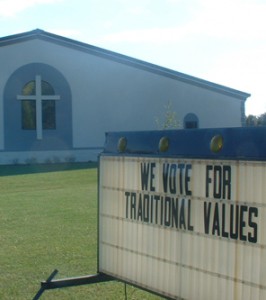
Most people strongly support two simple ideas that are in unavoidable conflict.
The first is freedom of speech. Government should not be censoring speech. Censorship is unacceptable. We rely on the marketplace of ideas.
The second idea is that government should be in the business of regulating the “finance” of speech.
The conflict between these two ideas is highlighted by the story of the FFRF pushing the IRS to enforce laws forcing preachers to refrain from “politics”. This article from the NYT and another one here tell the story.
First amendment rights are fundamental. We recoil at the idea of government censors dictating what we may or may not say. This is especially true on moral issues.
Our law is based on our ideas of right and wrong. Churches speak out constantly on moral issues – honesty, charity, envy, avarice, and justice. That’s what they do. Churches are the source of these ideas for most of us. Even those who reject the role of faith in law substitute their own ideas of what is “just” and “right”. We all accept the idea that the law should be based on some idea of justice and righteousness. The importance of free speech on moral issues is even more important than in politics.
Churches enjoy tax exemption on the same basis as other non-profit organizations. Planned Parenthood, Sierra Club, CFACT and OFA are all tax exempt.
Given that politics is inseparable from our ideas of right and wrong, how can we possibly separate moral admonitions from political speech? It is illogical and unthinkable to tell our churches that they cannot speak out on moral issues, but that is precisely what the FFRF wants churches to do to keep their tax exemption.
Once given the power to decide what is politics and what is not, how do we ensure that officials given this power would not abuse it? Would a future president use the IRS lever to silence Planned Parenthood by threatening their tax exempt status? How about the Sierra club? Both of these speak out on their own issues, but are clearly political. By what rule would they be exempt? The furor around the IRS and Lois Lerner should be instructive. When a power exists, abuse is almost inevitable.
Once officials have the power to decide what speech is acceptable, and what is not, their jobs will be to attempt to separate one kind of speech from another, and decide what may be said. These powerful officials are called censors.
It is hard to accept that regulations on “political activity” and “campaign finance” lead inevitably to this problem, but they do. Government officials charged with deciding what is “politics” and what is not have no choice but to end up being censors. When those they censor are the churches, the outrageous nature of the censorship becomes obvious, but in all cases, we are playing with fire.

